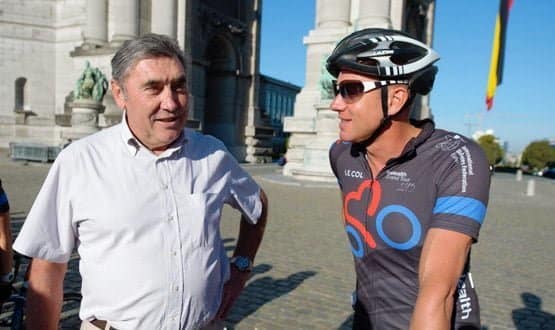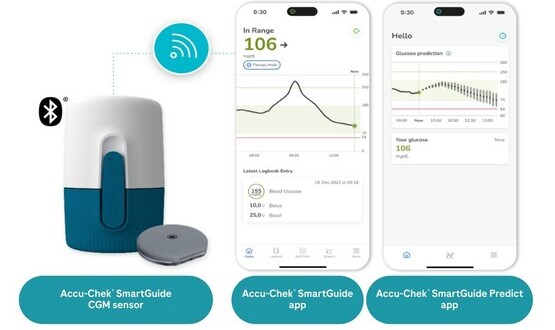Dispelling the Merckx around diabetes
- 9 September 2013

In the Parc Cinquantenaire in Brussels, more than 30 riders pose for a photo in front of a grand colonnade before setting off on the long journey to Barcelona.
Mingling and chatting in the morning sun, they appear as fit and healthy as any professional riders. In reality, many suffer from type 1 diabetes; and the tour is designed to monitor the impact of long-term exercise on their disease.
Big questions
Athletes with diabetes face additional challenges in regard to how they manage their blood glucose levels.
Meanwhile, it is well known anecdotally that exercise contributes to the healthy management of diabetes; but there have been few studies showing exactly why that might be the case.
The GSMA mHealth Grand Tour is a 13-day cycling challenge designed to answer these questions. Around 30 of the riders are part of a study being led by Newcastle University.
They are split into three groups; professional riders with type 1 diabetes; semi-professional cyclists with type 1 diabetes; and riders without the disease.
Together they will cycle 2100 km wearing continuous glucose monitors and heart rate monitors as well as equipment measuring calories burned and distance pedalled.
Before they assemble to be waved off on their journey by Belgian cycling legend Eddie Merckx (five times winner of the Tour de France, two-times plus winner of all of cycling’s classic races), they have already been wearing the monitors 24-hours-a-day for a fortnight. They will wear them for another two weeks after the ride.
Sensors to provide answers
The sensors and statistics from their bike computers transmit information to Sony mobile phones so riders can track their own progress.
The sensors also transmit the stats to an M2M module, which sits under the bike seat. That, in turn, sends the data over mobile broadband to a live website and to the cloud, where it can be downloaded by the Newcastle-based observational study team.
Researchers will be able to see the cyclists’ data within 20 minutes of it being recorded in real-time. By transmitting in two ways, the study team can see the impact of battery life of personal devices such as phones as well as possible issues with coverage, compared with the longer lasting M2M devices.
The cyclists are also recording how many calories they ingest every day to give an indication of the amount of glucose in the blood stream.
This first-of-its-kind observational study has been designed by Professor Michael Trenell, director of Newcastle University’s MoveLab.
“We were really interested in how we can start to better understand patient athletes with type 1 diabetes. This provided us with a unique opportunity to really look at how people with diabetes do some of the most challenging physical things on the planet,” he tells EHI.
“It’s the first time anybody has ever tried to do this. I hope we will do more events like this so we can improve the lives of people with diabetes and of diabetes services.”
Finding customers
As diabetes sufferer Veronica Nevrell shows off the software and hardware on a model bike, Esteve Vallve, Orange product manager for e-health, says the key is to take a tool that people buy already – such as a glucose monitor – and link that with an Android device and app.
“It’s a way to show that m-health solutions are ready from a legal and medical and industrial perspective,” he explains.
Vallve says that by making remote monitoring data accessible to health professionals, patients can reduce the number of contacts they have with the health service as doctors can see how they are progressing without physically seeing their patients.
He adds that Orange is already involved in trials of its mHealth products in France and the UK. The aim is to sell to the government as providers of health services, although Vallve says it will be up to the customer to decide who can access the data in the cloud.
“If the NHS wants a remote monitoring solution and wants to give access to only the patient and physician, they will do the administration of all the data,” Vallve says. “If another third party like an insurance company wants access we don’t have the right to give that, they need to talk to the NHS.”
mHealth for the future
To coincide with the bike race, the GSMA held its Mobile 360-Europe conference in Brussels. Unsurprisingly, mHealth was a key topic for discussion.
European president of the International Diabetes Federation, Jaoa Manuel, spoke about the huge potential for remote monitoring of his disease, which on average sucks up 10% of funding dedicated to health.
“People with diabetes and their health care providers need to be involved at all stages of mobile health development from inception to delivering, monitoring and evaluation,” he told the Brussels audience.
Dr Bernard Maillet, vice chair of the e-health working group for the standing Committee of European Doctors, tells EHI there needs to be trust built on both sides of the relationship for mHealth to take off.
Patients need to trust that services will not lose their personal data and health care professionals need to trust in the data that patients are providing via remote monitoring.
Clinicians are also wary of being completely overwhelmed with information. Dr Maillet says tools are necessary to highlight any unusual readings so doctors can quickly spot if there is an issue, rather than wade through potentially thousands of readings.
“Sometimes if you are overwhelmed with information you lose the message,” he explains. However, when talking about large datasets being used beyond the direct patient-doctor relationship, the issues become thornier.
“The big issue is who is using this information and what for? It it’s the authorities using it only for prevention issues or public health issues it’s not really a problem, but when it starts to be commercial it starts to be a problem,” he says.
The mHealth grand tour is due to finish on 18 September in Barcelona. You can track the progress of the riders online.



